Introduction
Alzheimer’s disease, a devastating neurological disorder, affects millions worldwide. Early detection is crucial for effective treatment, yet traditional diagnostic methods often fall short. Fortunately, recent advancements in artificial intelligence (AI) are transforming how we detect Alzheimer’s biomarkers in imaging studies. This article delves into AI-powered tools that enhance the accuracy and efficiency of early Alzheimer’s diagnosis, exploring their significance, benefits, and future potential.
The Role of Imaging Studies in Alzheimer’s Detection
Imaging studies, such as magnetic resonance imaging (MRI) and positron emission tomography (PET), have long been instrumental in identifying brain changes associated with Alzheimer’s. These techniques enable clinicians to visualize abnormalities in brain structure and function, offering critical insights into the disease’s progression. However, interpreting imaging data can be complex and prone to human error, necessitating innovative solutions.
Understanding Biomarkers
Biomarkers are biological indicators that signal the presence or progression of a disease. In the context of Alzheimer’s, specific biomarkers found in the brain can provide crucial information about the disease’s onset before clinical symptoms appear. Identifying these markers early can significantly improve patient outcomes by allowing for timely intervention.
How AI-Powered Tools Enhance Detection
AI-powered tools leverage machine learning algorithms to analyze vast datasets more effectively than traditional methods. These tools can identify patterns and anomalies in imaging studies that may be imperceptible to human eyes. Key advancements include:
- Enhanced Image Analysis: AI algorithms can process complex imaging data, facilitating the identification of subtle changes in brain structure associated with Alzheimer’s.
- Increased Accuracy: By minimizing human error, AI tools enhance diagnostic precision, leading to earlier and more reliable Alzheimer’s diagnoses.
- Predictive Analytics: AI can predict the risk of developing Alzheimer’s based on patterns observed in brain scans, providing invaluable information for preventative strategies.
Current AI Technologies in Use
Several AI technologies are currently employed in imaging studies for Alzheimer’s detection:
- Deep Learning: This subset of machine learning uses neural networks to analyze complex datasets, allowing for improved image classification and anomaly detection.
- Natural Language Processing (NLP): NLP algorithms can assess clinical notes and reports to extract relevant information, enhancing the overall diagnostic process.
Case Studies and Real-World Applications
Numerous studies have demonstrated the efficacy of AI-powered tools in detecting Alzheimer’s biomarkers:
Case Study 1: The Role of AI in MRI Analysis
A recent study utilized deep learning algorithms to analyze MRI scans from a large cohort of participants. The AI tool successfully identified early signs of Alzheimer’s, achieving an accuracy rate of over 90%. This remarkable performance highlights AI’s potential to revolutionize diagnostic practices and enable earlier intervention.
Case Study 2: Predictive Modeling Using PET Scans
Another study focused on the application of machine learning techniques to PET scan data. By training models on historical imaging data, researchers developed algorithms capable of predicting Alzheimer’s onset with impressive accuracy, leading to proactive treatment strategies.
Challenges and Limitations
Despite the significant potential of AI-powered tools, challenges remain:
- Data Quality: The effectiveness of AI tools depends heavily on the quality and quantity of the data used for training algorithms.
- Integration into Clinical Practice: Adopting AI technologies in clinical settings requires overcoming resistance to change among healthcare professionals and ensuring seamless integration into existing workflows.
The Future of AI in Alzheimer’s Detection
The future of AI in detecting Alzheimer’s biomarkers looks promising. As technology continues to advance, we can expect:
- Improved Algorithms: Ongoing research will lead to more sophisticated algorithms capable of analyzing diverse data types and extracting actionable insights.
- Personalized Medicine: AI tools may facilitate tailored treatment approaches based on individual biomarker profiles, enhancing patient outcomes.
- Wider Accessibility: As AI tools become more affordable and user-friendly, their integration in diverse healthcare settings will increase, democratizing access to advanced diagnostic capabilities.
Conclusion
AI-powered tools are at the forefront of transforming how we detect early Alzheimer’s biomarkers through imaging studies. By enhancing diagnostic accuracy, increasing efficiency, and providing predictive insights, these technologies offer hope for earlier intervention and improved patient outcomes. As we continue to explore the potential of AI in this realm, we stand on the brink of a new era in Alzheimer’s disease management, one that promises to change the lives of millions.

